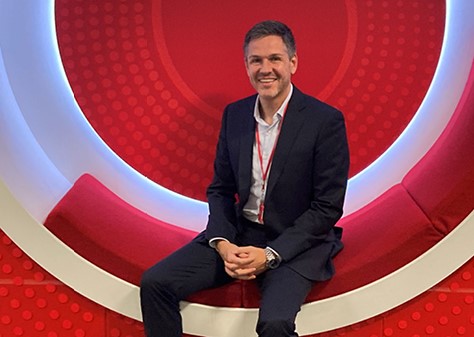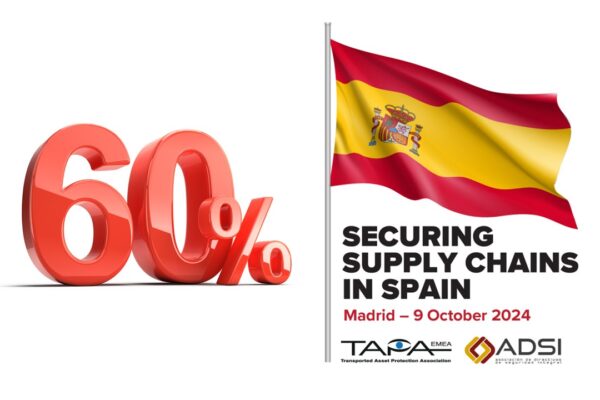
New onboard
This month, TAPA EMEA welcomed Norman Heit, Group Corporate Security Director of Vodafone, to its Supervisory Board and announced Vodafone as one of the 81 new companies which joined the TAPA EMEA Family in Q1 2022.
Norman will be familiar to members in the EMEA region, having been a great supporter of TAPA EMEA in his former companies as well as a speaker at the Association’s conferences. Early in his career, Norman was a Liaison Officer with the German Federal Police before spending over three years with Bayer, ultimately serving as Head of Corporate Crisis Management (Deputy Chief Security Officer). Prior to joining Vodafone in the UK last December, he was Head of Global Security Management at Boehringer Ingelheim for almost four years.
Vigilant spoke to Norman about his new TAPA EMEA role…
Why join the TAPA EMEA Supervisory Board?
Based on my background in law enforcement, I naturally have an interest in preventing and fighting crime. This nicely links with the loss prevention and asset protection approach that TAPA EMEA is driving. In the German police, there is a saying: ‘prevention above repression’, which means that the focus should lie in preventing crime from happening. This links to TAPA’s vision of hardening supply chains.
My interest in the emergence of crime led me to complete a master’s degree in criminology. In the course of my career within the private sector, I quickly developed an interest in securing supply chains and how the corporate security department can add value. During my time at Bayer AG, we investigated interesting and large-scale incidents within our supply chain, and in my role at Boehringer Ingelheim I was able to initiate the company’s first holistic supply chain security programme, led by Mark Gruentjes (well known to the TAPA EMEA Family).
Within Vodafone we have a very large number of suppliers, a delicate task for our supplier assurance programmes. I am grateful for the nomination to the TAPA EMEA Supervisory Board as it provides an opportunity to further develop and set standards and provide guidance and support that benefits TAPA EMEA’s large member base. I personally hope to bring an innovative and solution orientated mindset to the Supervisory Board and look forward to the collaboration.
What do you want to see TAPA EMEA achieve over the next 3-5 years?
TAPA EMEA has done very well in recent years in terms of utilising digital channels and expanding its reach and network. I personally would like to see TAPA EMEA taking a thought leadership role in developing innovative ideas and best practices for protecting supply chains and assets. This can happen through facilitation of ‘deplhi’ groups and projects, writing white papers or providing advice and guidance to develop security products. TAPA is known for its Facility, Trucking and Parking Security Requirements and trainings. I believe that TAPA can add additional value by exploring new and innovative approaches, taking supply chain resilience to the next level.
What can you do to support TAPA EMEAs growth within the network or operator business?
I will surely continue what I have done in the past by educating employees, stakeholders and customers about supply chain risk, trends and mitigation options, ensuring visibility of challenges within the discipline, and offering valuable solutions to the business. As we all know, security standards are often mistaken for roadblocks or showstoppers. We need to find convincing business cases that leave no doubt about the value that resilient supply chains bring to business operations.
What can TAPA EMEA do to support you within your Vodafone role?
Vodafone will benefit, as do all other members, from the great network opportunity that TAPA EMEA offers. This includes personal exchange, incident database, trainings, best practice sharing and much more. Unique in its scale as the largest pan-European and African technology communications company, Vodafone also brings great expertise and experience to TAPA EMEA, especially in the field of fraud, investigations and supplier assurance.
What is the size and scope of Vodafone’s supply chain operation/network?
Vodafone Supply Chain has an annual spend of €24 billion and includes 10,000 Vendors and around 860,000 Purchase Orders.
Why did you decide to join TAPA EMEA?
Vodafone is operating at a fascinating pace and in a highly agile environment. By the time we joined TAPA EMEA, I had already been involved in numerous incidents, crisis management and projects. Nevertheless, joining TAPA EMEA was an early opportunity to continue previous involvement and bring the value to Vodafone. The timing couldn’t have been any better as Vodafone Germany has just recently won the overall Vodafone corporate security award for their augmented reality approach to remote audits, a topic well-known to TAPA EMEA.
We now want to take those experiences to the next level whilst the group corporate security team is working on a new target operating model to ensure a securely connected future, including our approach to supply chain security at large.
You previously held another senior security role in the pharmaceutical industry – do you see more potential for TAPA EMEA to grow its presence in this industry, and can you help to leverage this growth through your own industry contacts?
The Security Industry still feels like a relatively small family, despite impressive growth over recent years. Practitioners and leaders across industries and regions know each other quite well. I personally enjoy building relationships with internal and external stakeholders and find it inspiring to exchange thoughts, challenges, and ideas with peers. My humble opinion in regard to your question is that TAPA EMEA should not primarily aim at growing its presence. I rather recommend focusing on solutions and adding value to supply chains. If TAPA EMEA is successful in improving standards, resilience and is able to provide real solutions, then growth and interest will follow automatically, especially as there is a lot of exchange between leaders, who will happily promote and recommend practicable solutions.
From a supply chain security/loss prevention perspective, what have been your personal big learning experiences of the last 2-3 years?
I think it is fair to say that large corporations often operate within well-established processes and patterns. It was challenging for me to implement change to take a different, potentially more modern approach. This includes, but is not limited, to the use of state-of-the-art technology and innovation. It was also interesting to see how the geopolitical environment has a significant impact on global supply chains, if you reflect on scenarios such as BREXIT or currently the war in Ukraine, which will likely have long-lasting consequences on supply chains and will require industry to re-think their operations and strategies in terms of both risks and opportunities.
What is your personal view on cargo crime? Is it rising and are Organised Crime Groups becoming more capable of targeting supply chains?
Crime and security are two counterparts of the same ‘scale game’. Criminals have always been operating across borders and have more recently shifted from physical modus operandi into cybercrime that significantly disrupts supply chains. Law enforcement has adapted to this trend by creating cybercrime departments/units and emphasising international collaboration. The advantage of, for example, large multinational operators like us is that we naturally also operate internationally and can leverage international teams of experts working in the field of security (corporate and cyber).
I believe that organised crime has exponentially grown their capabilities in the field of cybercrime and will exploit weaknesses within supply chains, including cargo. It is therefore of utmost importance that private industry, and also governments, invest into scaling security to become
front-footed in addressing risks and leveraging capabilities. This also includes exploring opportunities for private public partnerships and cross industry collaboration.
As you said, cybersecurity is clearly a significant and growing threat to supply chains – where/how do you see TAPA EMEA’s role in helping to reduce this risk?
TAPA has historically focused on physical security standards and training. I believe it would be beneficial to expand trainings and Standards development into the field of Cybersecurity, which is a common challenge and risk for TAPA’s member base.















